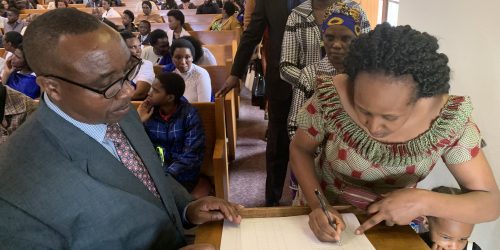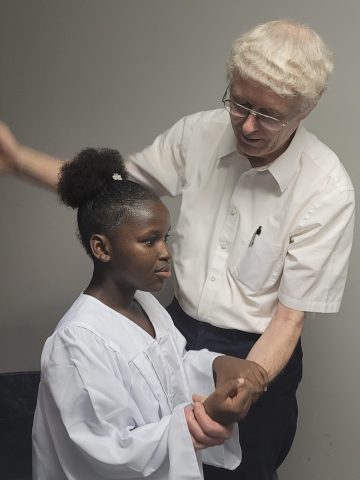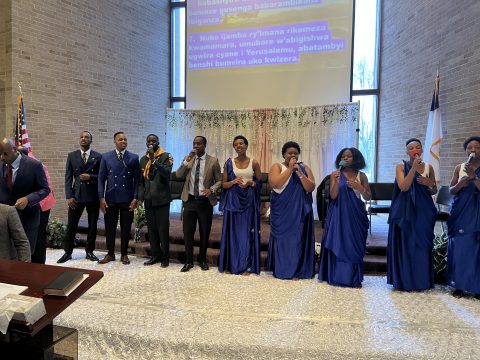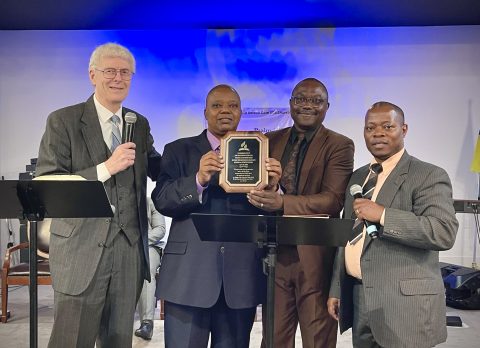
Justin Ringstaff, secretariat of the Michigan conference, remarked that the Elwell dedication was well-attended by members and guests alike. “It took over half an hour for everyone to sign the dedication book,” he remarked.
Elwell was dedicated as a church on April 9, and Golden Gate dedicated as a company on April 30, 2022.
Justin Ringstaff, secretariat of the Michigan conference, was in attendance for the Elwell dedication, and remarks that it was well-attended by members and guests alike. “It took over half an hour for everyone to sign the dedication book,” he remarked. Golden Gate was also full on April 30, with over eighty persons in attendance.
However, the significance of these two churches is not the numbers, rather, it is the journey the members have taken to form their respective congregations. Elwell Church and Golden Gate Company are comprised of mostly former refugees.
Bob Stewart, director of Immigrant and Refugee Ministries for the Michigan Conference, explains that both groups of Kinyarwanda-Kirundi speaking refugees started out as a branch Sabbath School out of the Grand Rapids Central Church. Most refugees do not speak English when they first arrive on American soil, and thus, refugees often create their own Sabbath schools so that they can speak and worship in their preferred language. However, according to Pastor Joel Mpabwanimana, NAD consultant for Kinyarwanda-Kirundi church plants, despite the possibility of a language barrier, for refugees, their number one concern is finding a place to worship the God who has brought them safely from war-stricken countries, such as Berundi, Democratic Republic of the Congo, or Rwanda, to name a few. When the refugees arrive, their first task is to find a church and worship, despite the possibility of having to sit through a service they do not understand.
There are now two refugee congregations in Grand Rapids, which is a central location for refugees. One of the congregations, Elwell, is the largest Rwandan church in North America, according to Bernard Rumenera, pastor of the Elwell church. Many sponsors bring refugees to this area, says Stewart. Mpabwanimana further comments that Kirundi refugees follow family. If a refugee family lands in Oregon, and their extended family is in Grand Rapids, they will travel across the country to be with them.

The Elwell and Golden Gate churches began as a refugee branch Sabbath school from the Central Church, where Stewart was lead pastor, before accepting the call to Refugee and Immigrant ministries for the Michigan Conference.
The branch-offs soon had enough members to qualify as a group, and eventually groups attain company status. It is of note that a company is not an official church entity. Membership is kept through the conference, through the conference clerk. Stewart explains that a company congregation is like parents giving their teenage child a bit of money, to see how they will handle it.
There is a process to see if the congregation is viable. “We’re looking for stability and good organization and good process,” says Stewart, “They need to have a mission focus,” and be “training their members to witness and share.”
Companies can grow fast or slow, depending on the individual group. For Elwell, the process was about three years in total. Golden Gate is not yet an official church, although they are well on their way, having just achieved company status. The time frames for both Elwell and Golden Gate, explain Stewart, are average for a company. However, for a refugee company, this is exceptional.
When refugees first arrive, he explains, “they were used to doing things different than how they are done in America.” Thus, running a church can be a learning process, especially when it comes to the paperwork and behind the scenes work needed to smoothly run a church.
Stewart also mentions the Acts model. Paul would come and start a church, but when he left, the “people took it upon themselves to keep [the church] going.” Many churches would fall apart without a pastor or leader, or without being an “official” church. However, Elwell and Golden Gate demonstrated the ability to push through. Stewart says, “there needs to be a sacrifice from the people” to move from company to a church. These sacrifices often have a lot to do with leadership or the lack thereof.
However, one of the most significant aspects of transitioning from a company to a church is acquiring a building. Often, one building cannot comfortably house two Seventh-day Adventist congregations. The Elwell church had what Stewart calls “a bit of a miracle” during their church hunting experience.
As the company was looking for a church building, a member from the Central Adventist Church recommended a large, 500 member Christian reform church that was planning to sell the building.
Unfortunately, there was another offer on the table, an offer which was much more than the Elwell company could afford.
Elwell church members see that God was looking out for them, for when the Christian reform church found out that the group looking to purchase their church was a refugee group, they ignored the other offer and accepted the Elwell company’s offer of just $280,000. “For a church of that size, that’s a steal,” says Stewart.
The Elwell company moved in and filled the church. There are 400-500 members, Stewart reports, not counting young children and unbaptized teens. “When all the families were counted,” says Rumenera, “it was about 1100 [persons].” He further comments that they are planning to grow the church’s membership.
The Golden Gate company was also able to acquire a building to house their worship services. Currently, they are renting Sabbaths from another denominational church. Wilson Sembeba, stand-in pastor for the Golden Gate church comments that, like Elwell, their church building is a miracle. When he called the pastor of the church they now rent, he was told there were four other interested parties. “I prayed for four days,” he said, until the pastor called back with the news: they were being given the chance to rent the church. The pastor also commented, “God told us to do this.”
Interestingly, the pastor had not even met Wilson face to face. “They still don’t even know who I am,” Sembeba says, laughing. Sembeba and his members believe that it was the Lord who opened the doors of the church they now call home.

It is a well-known statistic among church planters and church leadership that refugee churches grow significantly faster than other churches.
One reason why refugee churches grow so fast, Stewart explains, is simple. Rwandan refugees are very family oriented; they live right next to each other and are outside all day with their friends and relatives. The American way of life, consequently, is a culture shock to many refugees. Families in America appear to live more secluded from their neighbors and relatives. For Rwandan refugees, church is not only a place to worship our God, but it is also a place to fellowship with family, friends, and like believers.
But that’s not all. Stewart shares one more compelling reason why refugee churches grow so fast. “To be honest with you, they’re a little bit more on fire than we are. They believe in getting every member involved.”
And the Elwell and Golden Gate churches do have every member involved, even if it is just singing in a choir—Elwell has 12 choirs. Golden Gate is especially noteworthy for their acceptance of all refugees, no matter what language. Some speak Swahili, or French, but there is always an English translator, so all can feel welcome and understand the worship service. In addition to their inclusive environment, Golden Gate has already conducted several evangelism campaigns. They are planning one for the fall and are praying for a thousand guests.
Golden Gate also participates in door-to-door evangelism, despite many of the members, including Sembeba himself, being scared to conduct door-to-door ministries in America. But they chose faith over fear and have ministered to over 400 homes in the vicinity of their church neighborhood.
Rumenera and Sembeba both also minister to refugees around them, whether they are considered church members or not. Members or non-members alike get more involved “when they can see Jesus in what you do,” says Sembeba. Rumenera and Sembeba both are on call for their members, whether it is driving them to a doctor appointment, or helping someone know which medicine to buy if they are sick, as well as general visitations. Sembeba even bought a fourteen-passenger van, which stays close to the church, so that he can transport his members where they need to be. When people see Jesus in you, says Sembeba, “they can also see that you care for them.” The refugee churches truly practice putting others before themselves.
Sembeba and Golden Gate have begun a Zoom meeting for Kinyarwanda-Kirundi speakers, with an option to call in via phone. The ministry began in 2010 but is continually growing. Attendees are from all over the United States, and some even join from African countries. “They just go on the phone,” says Sembeba, “and they can speak and pray in their own language.” The meetings are seven days a week.
The other main reason for refugee church’s growth is that there are thousands of Adventist refugees, according to Mpabwanimana, still in refugee camps in other countries. He explains that the department of Homeland Security will only let in so many per year. Thus, refugees must continue to live in crowded camps. Mpabwanimana estimates that there are over 500,000 persons crowded into just one refugee camp. “The refugee camp is a horrible situation,” he says. There is no school, no farming, there is just nothing. There is not even ample food. When rations are distributed it is very little: five pounds of corn and maybe a pound of flour, for the whole month, and Rwandan families are large!
But despite the challenges, the Adventist church in the refugee camps is growing, reports Mpabwanimana. People are more likely to search for God during difficult times. Some, say Mpabwanimana, spend the night in prayer, pleading with God to bring them and their children safely to America.
And when they arrive in America, we can see it reflected in our membership numbers. “This is what I experienced when this war was happening with all these refugees,” says Mpabwanimana, “People embraced faith, became faithful to God… and the churches were full.”

The churches are indeed full, but there are still refugees who need help. After three months, according to Mpabwanimana, the agency that helped a refugee family no longer will provide aid. Rumenera also explains that many do not speak English and need help at the Secretary of State or other government entity to get work permits or IDs, or they need to be driven to and from jobs. They also may need clothing, food, or even money, or even gas for Sembeba’s fourteen-passenger van.
If you would like to help the refugees in Michigan, including those at the newly dedicated Grand Rapids Elwell or Golden Gate SDA Church, contact Bob Stewart at the Michigan Conference or mark your tithe envelopes “Immigrant and Refugee Ministries.”
Judy Klein, Michigan Conference Communication